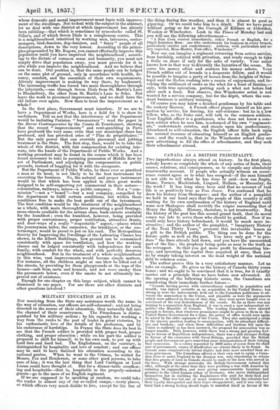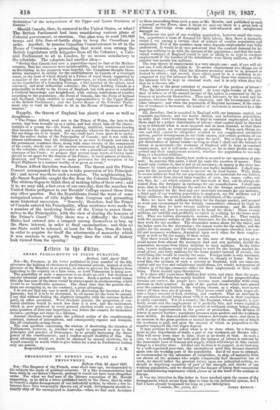CANADA AS A BRITISH PRINCIPALITY.
Two imperfections always attend on history. In the first place, nobody knows so completely the whole of any series of facts, their causes, relations, ahd consequences, as to compile any absolutely trustworthy account. If people who actually witness an occurrence cannot agree as to what has °calved—if the man himself is not able to tell what he has done or said—how can Rapin, Hume, Turner, Mackintosh, Lingard, Hallam, or Macaulay, do the work ? It has long since been said that no account of real
life is so positively true as Toni Tones. Fox confessed that he
drew his history from Shakspere ; and the author of a pamphlet we hold in our hand says that the people of this country is still waiting for its own continuation of the history of England until some new Shakspere shall revivify the reigns succeeding that of Henry the Eighth. History, therefore, is not trustworthy. But the history of the past has this second grand fault, that its moral
comes too late to serve those who should be guided. Now if we could only have history beforehand, it would be much more in
structive ; and the author of the pamphlet, "Imaginary History of the Next Thirty Years," presents this invaluable lesson as a gift to the British public. The thing can be done for the future quite as well as the past. You have only got "to pro duce" the lines already laid down, and you have the unexeouted_ part of the line ; the prophecy being quite as near to the truth as the retrospect. So that you get more profit by discounting history, and investing the capital thus acquired at once, than you do by simply taking interest on the dead weight of the national debt to common sense.
The author proves this in a very satisfactory manner. Let us take an example. He gives us the history of Canada thirty years hence ; and we ought to be convinced that it is true, for it exactly carries out a principle that we have before now advocated. At the opening ot the following historic scene, the Canadians are considering their immediate further future
" Canada having grown with extraordinary rapidity in population and wealth, was indeed enviable as an acquisition to the "United States ; but
strong as were the inducements held out to the Canadian politicians to ad vocate the annexation to the Union, and plausible as were the arguments which were adduced in favour of that step they were never bought over or convinced of the real desirableness of the course. So far as there was any leaning to a separation from England, it was to erect a new independent republic—the Republic of Canada. The leading Canadians were shrewd
enough foresee, that whatever prominence might e . United them in Government for time, prizes of office would .2,11:
be seized by the older aspirants of the Union. They also anticipated a crisis
of the slavery question leading to emancipation, with its attendant difficulties and burdens ; and when those difficulties and burdens fell upon the Union so suddenly as has been narrated, the proposal for annexation was no longer tenable. Still, however, while there was a strong and growing feeling in favour of Republican independence, there was a still stronger feeling in favour of the connexion with Great Britain, provided that the British people and Government gave somewhat more demonstration of their valuing that connexion. In a colony separated by 3000 miles of ocean from its chief seat of government, causes of disaffection are always likely to be found. In Canada some comparatively trivial slights had done more mischief than serious grievances. The Canadians offered at their own cost to equip a Canadian force to assist England in the Russian war, only stipulating in return that free grants of land in Canada should be made to the men who served in the force. With strange perversity the British Government refused this offer, although at the same time they were perilling a war with America by enlisting its ragamuffins, and were giving unaccountable bounties and promises to the vilest human refuse of Germany, who never distinguished themselves but in stabbing the Englishmen who paid for their food and clothing. This was but one of many instances in which the colonists had their loyalty disregarded and their hopes disappointed ; and it was only natural that a strung fueling ohould begin to manifest itself in favour of the
declaration 'of the independence of the Upper and Lower Provinces of Canada."
Should Canada, then, be annexed to the United States, or what? The British Parliament had been considering various plans of Colonial government, or coercion. One plan was, to send 100,000 troops and fifty line-of-battle ships to keep the Canadians in order. Another, to receive Canadian Commissioners to sit in the House of Commons,—a proceeding that would soon swamp the British Legislature with delegates from all the Colonies ; a Colonial Parliament to sit in London, by no means satisfactory to the colonists. The colonists had another idea " Seeing that Canada had now a population equal to that of the Mothercountry, that her resources were inexhaustible, and her revenue and trade as flourishing as her prospects were hopeful, the Canadians thought them*elves warranted in calling for the establishment in Canada of a viceregal court, at the head of which should be a Prince of royal blood, supported by a number of the sons of the English aristocracy, to whom should be added, is the foundation of a Canadian Peerage, a like number of the ablest, most 'esteemed, and most influential colonists ; the Prince holding Canada as a principality in fealty to the Crown of England, but with power to establish a Colonial baronetage and knighthood, with certain restrictions of number according to the population; the Peers of Canada, like the Peers of Ireland and Scotland, being entitled to send representatives to the Upper House of the British Parliament ; and tho Lower House of the Colonial Parliament also to send its Speaker to sit in the House of Commons at Westminster."
Happily, the Queen of England. has plenty of sons as well as daughters " The Prince Alfred, next son to the Prince of Wales the heir to the crown, had been brought up as a sailor, and had about him all the characteristics of a young tar—the frank, dishing, mirthful, boisterous bearing that becomes the quarter-deck, and is popular wherever the descendants of the sea-kings are to be found. No one could have been more fit to undertake the active duties of the Principality of Canada ; and it was with the utmost enthusiasm that his willingness to go over to Canada and take up his permanent residence there, along with some twenty_ of the companions of his youth, chiefly eons of the ancient aristocracy of England, was hailed by the colonists, who at once proceeded to vote a munificent civil list for the expenses of his Court ; to propose that several large tracts of Crown lands should be set apart for the domain of the Prince ; to erect palaces at Quebec, Montreal, and Toronto ; and to make provision for the reception of his Royal Highness in a manner worthy of so great an event."
Prince Alfred therefore was chosen. The Queen and the Prince Consort accompanied their son to take possession of his Principality; and never was there such a reception. The neighbouring Anglo-Saxon Re-public caught the fire from the Colonial. Principality. The citizens began to think then of making titles of their own ; and it is, we may acid, a fact even of our own day, that the searches for United States pedigrees in our Heralds' College exceed those from any other quarter. But the Republicans found the want of some recognized source of title higher than Congress and presenting
more historical succession. Scarcely, therefore, had the Prince of Canada entered his Principality, when overtures were made by a number of the bordering States of the Union to annex themselves to the Principality, with the view of sharing the honours of -the Prince's Court.' Only there was a difficulty: the United States had entered into a compact among themselves to buyup the Slave interest, in order to final emancipation ; and thus no one State could be released, at least for the tune, from the bond, in order to acquire for itself the adornments of monarchy which it was anxious to regain. So happy does the vista of history look viewed from the opening



























 Previous page
Previous page